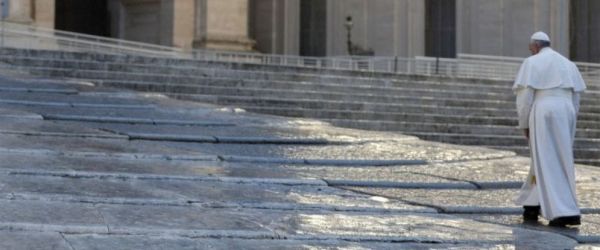There are many Christians who do not know joy. And even when they are in church praising God, they look more like they are at a funeral than a joyful celebration. If instead they learn to come out of themselves and give thanks to God, "they would really understand what that joy is that sets us free".
And it was precisely Christian joy that was the focus of Pope Francis' homily this morning, Friday 31 May, Feast of the Visitation, during the concelebrated Mass in the chapel of the Domus Sanctae Marthae [...].
"Today's two readings," began the Pontiff, referring to passages from the book of the prophet Zephaniah (3:14-18) and from the Gospel of Luke (1:39-56), "speak to us of joy, of gladness: 'Rejoice, shout for joy,' says Zephaniah. Shouting for joy. Cool this! "The Lord is in your midst"; do not be afraid; "do not let your arms fall down"! The Lord is powerful; he will rejoice for you. He too will rejoice for us. He too is joyful. "He will exult over you with shouts of joy". Hear how many good things are said about joy!".
In the Gospel account, joy characterises Mary's visit to Elizabeth. "Our Lady goes to visit Elizabeth," the Holy Father recalled. And presenting the image of Mary as a mother who is always in a hurry - just as he had done last Sunday in the Roman parish of Saints Elizabeth and Zechariah - Pope Francis dwelt on that "gasp of the child in Elizabeth's womb" revealed by her to Mary herself: "Behold, as soon as your greeting reached my ears, the child gasped with joy in my womb".
"Everything is joy. But we Christians,' noted the bishop of Rome, 'are not so used to talking about joy, joyfulness. I think that many times we like complaints more! What is joy? The key to understanding this joy is what the gospel says: "Elizabeth was filled with the Holy Spirit". What gives us joy is the Holy Spirit. Even in the first prayer of the Mass we asked for the grace of docility to the Holy Spirit, the one who gives us joy'.
The Pope then spoke of another aspect of joy that comes to us from the Spirit. "Let us think," he said, "of that moment when Our Lady and St Joseph take Jesus to the temple to fulfil the Law. The gospel says that they go and do what was written in the Law". There are also two elders there; but, he noted, the Gospel does not say that they went there to fulfil the Law, but rather because they were driven by the 'power of the Holy Spirit. The Spirit brings them to the temple'. So much so that, before Jesus, the two "make a prayer of praise: but this is the Messiah, blessed be the Lord! And they also make a spontaneous liturgy of joy". It is the faithfulness matured over so many years waiting for the Holy Spirit that makes "this Spirit come and give them joy".
"I like to think," Pope Francis went on to confide, "that the young people fulfil the Law; the elderly have the freedom to let the Spirit guide them. And this is beautiful! It is the Spirit who guides us. He is the author of joy, the creator of joy. And this joy in the Spirit gives us true Christian freedom. Without joy we Christians cannot become free. We become slaves of our sadnesses'.
So the Pontiff quoted "the great Paul VI", recalling that he said "you cannot carry the Gospel forward with sad, disheartened, discouraged Christians; you cannot. This attitude is a bit funerary". Instead, Christian joy comes precisely from praising God.
"But what is this praising God?" the Pope asked. "Praise him gratuitously, as the grace he gives us is gratuitous" was his response. Then, turning to one of those present at the celebration, he said: 'May I ask the question to you who are here at Mass: do you praise God? Or just asking God and thanking God? But praise God?" This, he repeated, means 'going out of ourselves to praise God, wasting time praising'.
At this point the Pontiff referred to one of the criticisms that is often levelled at priests: 'This mass you do is long'. Of course, he explained, still addressing those present, 'if you don't praise God and don't know the gratuitousness of wasting time praising God, of course it's a long mass! But if you go to this attitude of joy, of praising God, that is beautiful'. After all, 'eternity will be this: praising God. But this will not be boring, it will be beautiful. This joy sets us free'.
"And I want to add," he said in conclusion, "one last thing: it is she, Our Lady, who brings joy. The Church calls it the cause of our joy, causa nostrae letitiae, Why? Because it brings our greatest joy, it brings Jesus. And by bringing Jesus, she makes 'this child leap in his mother's womb'. She brings Jesus. She with her prayer causes the Holy Spirit to burst in. She burst forth on that day of Pentecost; she was there. We must pray to Our Lady so that by carrying Jesus she may give us the grace of joy, of freedom; Give us the grace to praise, to make a prayer of free praise, because he is worthy of praise, always".
[Pope Francis, S. Marta homily, in L'Osservatore Romano 01/06/2013]












